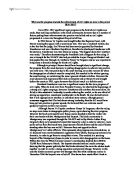Another factor contributing to slow progress towards racial equality was the opposition among the general public. Truman’s ideas were simply not comprehensive enough to deal with the amount of racism which existed in the country. Specifically in the south, where still many people, mainly Dixiecrats refused to support Truman and his policies. Despite growth in the North, Black American’s still suffered segregation in certain Southern States; Black American’s were often regarded as second class citizens. This is why there was little progress made, as there was little support between the government and the public.
Even though there were many methods of protest against segregation, these were ineffective. Campaigns were not co-ordinated to create maximum impact. Groups such as the NAACP and CORE did not have enough members, to make their protest effective to the public. Also protests which they carried out were not carried out for a long amount of time. One example of this was when the UDL (who were part of the NAACP) organised a week-long bus boycott in Louisiana’s capital. Despite the effort which had gone into the boycott, this was not long enough and therefore failed to force the bus companies in southern states to desegregate their interstate services.
Legal factors are important when it comes to segregation. Despite there being successful legal cases, such as Sweatt v. Painter case in 1950, which went to the Supreme Court, there still was segregation. This was because this made very little impact to everyone else in society. This links back to public opposition, as regardless of cases being won, there was still racial discrimination in certain parts of the country, particularly the south as people genuinely believed that Black American’s should be valued less than themselves.
Despite there being effects of desegregation, there still was widespread discrimination. This was mainly due to there being little impact throughout the country. For example, protests about schools and buses were only small, and therefore there was little protest made. Due to such a high level of discrimination, the government didn’t know where to start; consequently the life for Black Americans was difficult to counter for.
In conclusion, the main reason there was little progress made towards racial equality in the period 1945-1955, was due to the government and their views towards President Truman. Despite being able to provide new legislation to states within the country, it was automatically the Governments decision whether this was going to be implemented.








